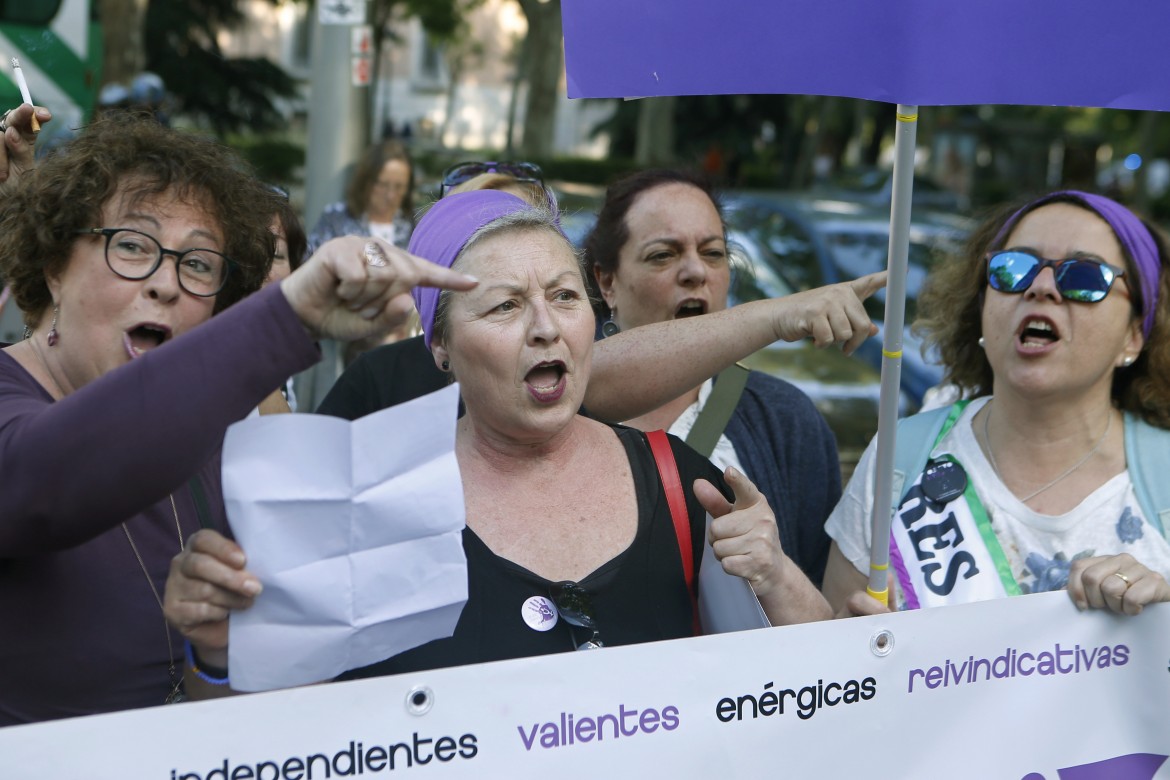Reportage
#AlertaFeminista rallies shake Spanish cities
Spanish feminists held demonstrations in 70 cities to demand that the government respect the budgetary commitments it made to combat gender-based violence.

They are feminists, they are many of them, and they are angry. Thousands of demonstrators gathered under the slogan “Compromiso = Presupuesto. La lucha sigue, Nos vemos en las calles. ¡Ni una menos!” in 70 cities in Spain to demand that the 2018 state budget, now under discussion in Parliament, delivers the expected funding of €200 million, 0.04 percent of the overall budget, agreed upon in the State Pact against Gender Violence.
It has been almost a year of negotiations and debates about the 214 measures already approved, which, however, without adequate funding, remain nothing more than good intentions put to paper, useless as political promises often are. The women went back into the streets to demand their due, even as the State Pact does not meet all their demands, but is largely confined to reaffirming the commitment to implement the old Equality Law of 2004.
One should note that the problem is not that the money is lacking—rather, the problem is that the priorities of the right-wing government are different, such as increasing the budget of the Ministry of Defense by €819 million (10.7 percent more than in 2017) or continuing to finance the bailouts of banks and the construction of new highways. These they value more than the respect for the lives of 51 percent of the population, for which the government has decided to allocate only €80 million, stealing away the €120 million more that had been agreed upon.
The Spanish feminist organizations feel they are being cheated, but they cannot be intimidated, after demanding for years that male violence against women should be considered a matter within the responsibility of the State and should be treated on a par with the crime of terrorism, which calls for maximum institutional, social and political involvement.
The numbers are the proof of the feminists’ claims: this is nothing but terrorism disguised as machismo. Since official data collection on this issue began (14 years ago), 917 women and 23 children have been killed by sexist violence, while 47 women were killed in the course of 2017.
Every year, more than 150,000 cases of gender violence are reported in Spain, taking into account that the latest macro survey on male violence against women, conducted by the government delegation on gender violence, concluded that only about 20 percent of all violent acts against women are actually reported. Thus, the feminists are not exaggerating when they say that this is one of the most serious and important social issues to be dealt with, which concerns everybody.
Faced with a government that only expresses dismay and condemnation whenever a sexist murder happens, but which does not afterwards assume the responsibility to eradicate such violence, the feminists are tired of talk and are demanding real policies. Of the 214 measures envisaged by the Pact, at least 119 require financing, and with only €80 million allocated so far, few if any will end up being put into practice successfully. This means that the public education system will not be able to create a gender violence prevention program, and that the social, legal and psychological support services, left without funding, will not be able to create a new shared system to track the condition of those who are suffering sexist violence. Furthermore, the health centers across the country, as well as the hospitals, will not be able to provide adequate care to the one million women, about 7.2 percent of the feminine population over 16, who have suffered at least one episode of sexist violence in all its forms.
When Spain stopped working on March 8 during the global women’s strike, Prime Minister Rajoy was supportive and chose to wear, as a sign of support, a purple tie, the favorite color of the feminist groups—but his is, and remains, a male-dominated government. A government which, in the eight months in which the State Pact has been in force, has not implemented any of the measures agreed. The Minister of Equality, Dolors Montserrat, who tweets that gender violence is a priority of the government and then fails to defend the funding for the State Pact, would do best to resign. The committee that has been called to outline the reform of the Penal Code regarding sexual offences, after the scandalous ruling that classified rape as mere sexual abuse, has no woman member among the distinguished professors that make it up. When they became aware of this problem, the members of the committee did not manage to find a female member of academia willing to be a part of it, since their activities are not permanent and only occur from time to time.
In the end, this is not a joint committee, but rather a fraud that sheds light on the patriarchal justice system, ignorant of gender issues, unprepared, with macho prejudices and stereotypes that are reflected in the interpretation and application of laws. It is a justice system that indicts the victims of violence more than the perpetrators.
In Madrid, Zaragoza, Bilbao, Valencia, Barcelona, Seville, Malaga and dozens of other cities, the demonstrations convened under the hashtag #AlertaFeminista16Mayo, with more than 300 feminist organizations taking to the streets, showing that Spanish society is several steps ahead of Rajoy and his government, and that a purple tie is not enough—what is needed is real commitments, and a change in culture, in order to eradicate sexist violence.
Originally published at https://ilmanifesto.it/alertafeminista-scuote-la-spagna/ on 2018-05-17
